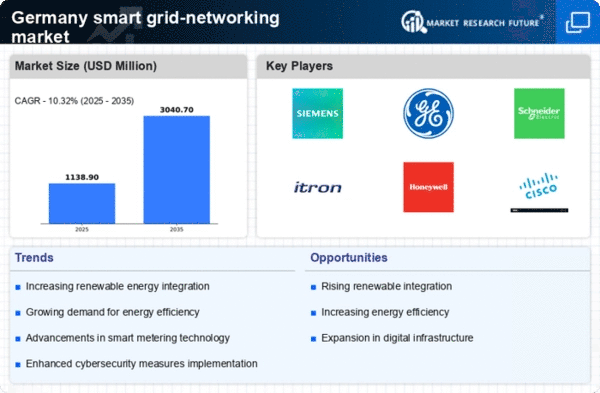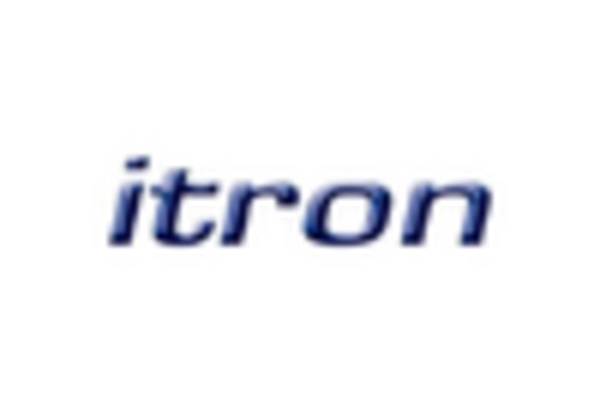Growing Demand for Energy Efficiency
The increasing emphasis on energy efficiency is a significant driver for the smart grid-networking market in Germany. With rising energy costs and environmental concerns, both consumers and businesses are seeking ways to reduce their energy consumption. The German government has set a target to improve energy efficiency by 30% by 2030, which is likely to spur investments in smart grid technologies. These technologies enable better demand response and load management, allowing for optimized energy use. As a result, the smart grid-networking market is poised for growth, as stakeholders recognize the potential for cost savings and sustainability through enhanced energy efficiency measures.
Regulatory Support for Renewable Energy
The German government has established a robust regulatory framework that promotes the integration of renewable energy sources into the smart grid-networking market. This framework includes incentives for solar and wind energy, which are crucial for achieving Germany's ambitious climate goals. As of 2025, approximately 50% of the electricity consumed in Germany is generated from renewable sources, necessitating advanced networking solutions to manage this influx. The regulatory environment encourages investments in smart grid technologies, which are essential for optimizing energy distribution and enhancing grid reliability. This supportive policy landscape is likely to drive growth in the smart grid-networking market, as utilities and energy providers seek to comply with regulations while improving operational efficiency.
Urbanization and Smart City Initiatives
Germany's rapid urbanization and the push for smart city initiatives are significantly influencing the smart grid-networking market. As urban areas expand, the demand for reliable and efficient energy solutions increases. Smart city projects often incorporate smart grid technologies to enhance energy distribution and management. By 2025, it is anticipated that major German cities will implement smart grid solutions to support their infrastructure, improving energy resilience and sustainability. This trend not only addresses the challenges posed by urban growth but also aligns with Germany's commitment to reducing carbon emissions. Consequently, the smart grid-networking market is likely to benefit from the integration of these technologies into urban planning and development.
Increased Consumer Awareness and Participation
Consumer awareness regarding energy consumption and sustainability is on the rise in Germany, which is positively impacting the smart grid-networking market. As individuals become more informed about their energy usage, there is a growing demand for solutions that provide transparency and control. Smart grid technologies, such as home energy management systems, empower consumers to monitor and adjust their energy consumption patterns. This shift towards active participation in energy management is expected to drive market growth, as utilities respond to consumer needs by offering innovative products and services. By 2025, it is likely that consumer engagement will play a pivotal role in shaping the future of the smart grid-networking market.
Technological Advancements in Energy Management
Technological innovations are transforming the smart grid-networking market in Germany, particularly in energy management systems. The adoption of Internet of Things (IoT) devices and artificial intelligence (AI) is enabling real-time monitoring and control of energy consumption. By 2025, it is projected that smart meters will cover over 80% of households in Germany, facilitating better energy management and consumer engagement. These advancements not only enhance operational efficiency but also contribute to the reduction of energy waste. As utilities invest in these technologies, the smart grid-networking market is expected to expand, driven by the need for more sophisticated energy management solutions that can adapt to changing consumer demands and integrate diverse energy sources.
















